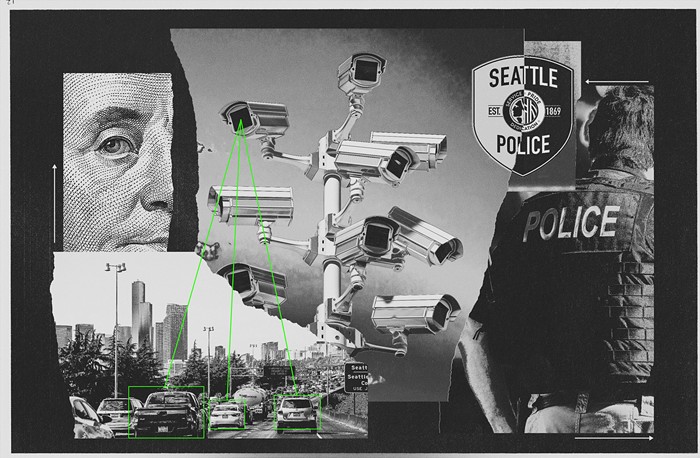
Like internet porn, the Pledge of Allegiance, and heterosexuality, the police are one of those institutions that feel like they’ve always existed but in fact have only been around for a very short amount of time. The first American police department appeared in the mid 1800s, following in the footsteps of slave-chasing vigilante groups; anxiety about immigration and labor organizing led to an expansion in organized state security forces over the next few decades.
We’re used to having them around now, but there was a time before police, and there will be a time after. Seattle spends a bit less than half a billion dollars a year on cops. What would the city look like without them? (Aside from there being one less float in the Pride parade.) Well, that depends on just how serious we are about defunding or outright abolition.
For years, we’ve heard about police reform—more cameras! Diversity training! Banning choke holds (that still get used anyway after they’re banned)! But are police even reformable? Maybe those measures help a bit as a treat, but “systemic racism exists in the City of Seattle Police Department,” says the Martin Luther King County Labor Council. Nearly half of people who are arrested have incomes under $10,000 per year. Gay, lesbian, and bisexual people are jailed three times more than the general population.
“When people say things have gotten better, what they’re really saying is we’ve gone from totally racist to medium racist,” says San Diego community leader Tasha Williamson. “We’re asking for no racist.”
One firmer approach that cities have started considering, now that the police seem to be in an outright war with peaceful citizens, is simply taking away their budgets. In LA, Mayor Garcetti plans to cut $150 million from the $1.8 billion police budget and put that money into services that benefit communities victimized by the police. In San Diego, citizens are pushing the city council to reject the mayor’s proposed $27 million increase in police funding.
New York mayor Bill de Blasio timidly proposed cutting the mammoth $6 billion police budget by 1%; Comptroller Scott Stringer suggested cuts totalling $1.1 billion that could be reallocated to “social workers, counselors, community-based violence interrupters, and other trained professionals.”
That proposal gets to the heart of what a world could look like without police—or at least, with police in roles that actually protect the public, rather than tear-gassing citizens or taking away what little shelter they have. A lot of police abolition proposals have noted that cops’ jobs should be far more limited than what they currently are.
The U.S. spends a tiny amount on social services compared to other nations. Abolitionists say that jobs like responding to people in crisis and taking statements should be given to experts in different areas, rather than to heavily-armed jacks-of-all-trades. Traffic wardens, justices of the peace, social workers, animal control officers… these jobs exist, and it’s weird that we ask barely-trained cops to try to perform all of them.
And if defunding the police means fewer cops on the street … maybe that will actually reduce crime. Back in 2014, the NYPD staged a halt of aggressive police tactics as part of a protest. But the effect wasn’t what they expected: Crime actually went down when cops took a more passive role, in the same way that today the protests escalate to violence when police decide to get violent. Although crime decreased 26% from 1993 to 2000, police were only responsible for 1.3% of that decline.
Ultimately, the public's enthusiasm for police abolition will probably come down to our own personal experiences with cops—which after the last week, is probably not going to be great for a lot of people.
Even if you haven't been a victim of police violence, chances are pretty good that at some point you’ve gone to them when you needed help, only to be met with little more than, “damn, that sucks.”
Speaking just for myself: A few years ago in LA, I was deliberately hit by a driver who didn’t like that I was riding a bike in the road; when I went to a police station with GoPro footage of the car swerving to hit me, they didn’t want to take a report because my bike wasn’t damaged. When that bike was stolen a few months later, the cop shrugged “sorry that happened to you,” and didn’t even know that there was a national registry for bike serial numbers that could be checked. A few years later, my car was broken into and the responding cop didn’t want to get the security footage from the gas station next door because "this stuff just happens."
My latest interaction with police was two years ago, at Seattle’s besieged East Precinct. I got a death threat from someone who didn’t like a blog post I wrote, so I went to the police to file a report in case my body was found bloodied in an alley. The cop at the precinct said it wasn’t worth taking a report unless someone actually came after me in person; but if that did happen, I should feel free to give them a call.
Since then, every time I walk past that place, I find myself wondering: What exactly are we paying for?
Our small, mighty, and local team is working hard to bring you coverage from Seattle's ongoing protests and policy discussions in response to the killing of George Floyd. If you are able, please consider supporting our work.



















